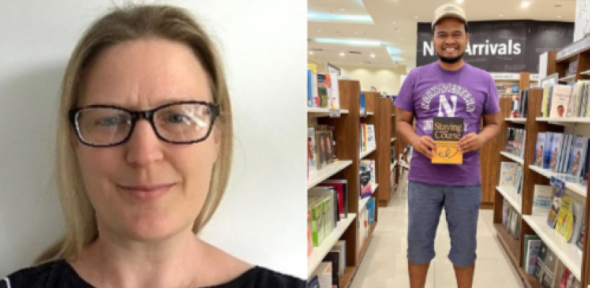Institute of Continuing Education (ICE)

Submitted by Ella Brooker on Fri, 06/10/2023 - 11:22
Being a new student at a new institution can be challenging, albeit exciting and rewarding. There are many adjustments that may have to be made to get the most out your time with ICE. Whether that be changes to your lifestyle, work ethic or organisation, dedicating some time to improve your studies can be transformative to your success and happiness on your course.
Two ICE alumni share their tips and advice on how to get the optimal outcome from your course.
Academic Centre Coordinator Anna Gouveia speaks from experience as someone who has studied not once, but twice at The Institute of Continuing Education. She studied an Undergraduate Certificate in English Literature: Approaches to Literary Study in 2020-21 and another in English Literature: Texts and Contexts in 2021-22 and is about to start an Undergraduate Certificate in Strategic Business and Management this year.
She says: “Returning to study after a few years’ break can be daunting, but ICE will support you to get the most out of your course and achieve your potential. A lot of advice and guidance will be given from your tutors before submitting any assignments, but I have a few top tips to help you squeeze the most out of your studies.”
Get your reading done early
Reading for study can take much longer than you may expect. To do this thoroughly you want to be able to understand what you have read, process it, and start thinking about it.
Taking notes as you go along is always advised. Anna says: “I would recommend getting some of your required reading done early in the semester, or even before the semester starts.
There are many more demands as the semester progresses when you must attend teaching and prepare for assignments, so having the reading sorted gets you off to a good start.”
Anna shares how she personally got the most out of any online sessions by doing the reading beforehand and taking some time to think about what she had read.
“I found that having questions and views to share with tutors and classmates during the online sessions really increased my understanding and enjoyment of what we learnt during the session.”
Conversely, she shares feeling a little lost and less able to contribute to group discussions when she did not have time to prepare.
When Anna first returned to essay writing, she found she was trying to cover too much ground: “I was going down endless rabbit holes and giving myself a gigantic headache in the process. I then discovered a technique of selecting three specific areas of focus I really wanted to explore in detail.”
By covering these three areas and focusing on them in depth, enough content is provided to meet the word count easily without overwhelming yourself with too many different ideas.
For literature essays, Anna specifically advises taking those three areas, looking at close analysis of the text, how the area of focus relates to other parts of the text and the context of the work (e.g. historical, socio-political, intertextual.)
Of course, it is important to remember that everyone has different learning styles- what works for one person may not be as affective for another. Mainly, by keeping organised and finding a routine to stay on top of your work that speaks to you is key.
Anna says: “I truly hope you get as much from studying with ICE as I have done.”
Asrif Yusoff was a student in the MSt Social Innovation programme in 2017 and has experience as a part time student for almost 10 years. He has recently published a book entitled “Staying the Course: Navigating the Challenges of Part-time Study” which aims to provide guidance to those considering study whilst working.
He gives his top three study tips as referred to in his book below:
By integrating your academic journey with your professional career, Asrif explains how you will see the practical applications of your studies in real time- “When your work and study complement each other, you are able to attain both academic depth of understanding as well as a better appreciation of applying theory into practice.”
Share your journey with the people closest to you. You will then be able to gain their support. Asrif says: “Living with two toddlers, my wife has been a strong support system through my studies whenever I have an exam or a paper due. I try to do the same for her as well!”
When starting a course, Asrif advises looking at the assignments and exams involved as soon as you receive the syllabus. He says: “Doing this would give me an idea of what to prepare for as I progress in the class. I also try to attempt assignments as early as I can, no matter how raw or unstructured- it surely beats the stress of scrambling last-minute work.”
With this invaluable advice on board, we wish good luck to all new students with their studies.